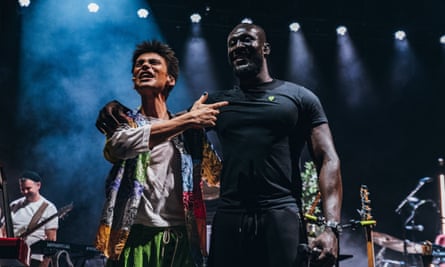“One hundred thousand voices all singing together in harmony – that’s what gets me excited,” Jacob Collier says. “It’s an anthem that has become the soundtrack to my life.”
Seventy dates into his year‑long world tour, the 28-year-old British multi-instrumentalist is surrounded by song. Each night, Collier sits behind the piano and begins playing an undecided and unrehearsed cover to his audience of thousands. He feels his way around the keys without knowing where he will land, eventually settling on a pop standard such as the Bee Gees’ How Deep Is Your Love or Abba’s Dancing Queen and conducting the crowd with his hands in a multilayered choral singalong that ends his two-hour shows.
His latest single is the culmination of this impromptu practice. Combining audience vocals from the US leg of the tour with thousands of individual video submissions from fans, Collier’s version of Elvis Presley’s Can’t Help Falling in Love swells from a massed opening singalong to a rousing and surprisingly moving multipart harmony produced by his choir of 100,000 voices. In under two minutes, Collier spans both the simplicity of a school assembly rendition and the head-scratching complexity of so many voices interweaving that the individual is obliterated.
“These covers have lifted my idea of what music can do – it’s almost spiritual,” Collier says with a smile. “Everyone is giving voice to the musician within them, like we’re all showing up for music-making together. I’ve made each crowd sing in harmony around the world and it has never once failed.”
This is the kind of wildly original musical experiment that has come to characterise Collier’s decade-long career. Since shooting to viral fame in 2013 with a multitracked YouTube cover of Stevie Wonder’s Don’t You Worry ’Bout a Thing – where he sings a six-part harmony and plays each instrument including guitar, double bass, keys and percussion – Collier has gone on to produce four albums that traverse everything from folk to pop, R&B, jazz and classical choral compositions. He has five Grammy wins, and became the only British act to win the award for songs off each of his first four albums.
Self-taught until he was 18 and still living in his mother’s north London home, where he makes music in the same room he first learned to walk in, Collier has been labelled by the media as a “jazz messiah” and “genius”. His mastery of non-standardised pitch and use of quarter-tone scales that exist beyond and between the 12 notes largely used in western music have earned him illustrious fans such as the bandleader-composers Quincy Jones and Herbie Hancock – whom he describes as his “godfathers” – as well as the film composer Hans Zimmer and Chris Martin of Coldplay.
I was exhausted from being on my own for so long. I wanted company and to learn from others how to make music better
However, for all the critical acclaim and artist recommendations, Collier is yet to achieve a huge radio hit. His complex music can feel like a niche pursuit for obsessives – a 2021 New York Times article labelled him “a staggering musical prodigy – with strangely mundane songs”.
“I’ve never thought about pleasing others,” he says. “I don’t worry about prestige or genre; I just feel the most pressure from myself. I have so many ideas that I call it ‘creative infinity syndrome’ and the challenge is to work out a way for these ideas to be born into the world. I have to do that in the most honest and Jacobean fashion that I can.”
Keeping things “Jacobean” seems to mean, above all else, a fidelity to restless creativity and eccentricity. When we meet at the north London offices of his record label, Universal, he comes across as a physical embodiment of his music. Just as his tunes are bright and often playful, in person Collier sports a pair of neon pink trousers, a bright green jumper and clunky Crocs, while his brown hair is spiked into a towering frizz. He has just woken up from a much-needed 14-hour sleep after flying across the Atlantic following a sold-out show in Miami. “Sorry if I’m a little woolly minded,” he says in a remarkably deep baritone while contorting himself on to a sofa. “This year has been exhausting and exhilarating in equal measure.”
Jacob Collier shows off his Grammy for best arrangement, instruments and vocals for He Won’t Hold You. Photograph: Jordan Strauss/Invision/AP
Mainstream hits or not, Collier has managed to build a loyal fanbase that keeps him relentlessly busy. His social media following is staggering: 1.7 million people on Instagram, more than 10m likes on TikTok and more than 1 million subscribers on YouTube. After 2016’s debut album, In My Room, where Collier meticulously arranged and played 11 jazz and pop compositions all from his family music room (his parents are both classical musicians), he set out to complete an ambitious quartet of records, entitled Djesse. The title, with its silent “D”, is a riff on Collier’s initials, and each volume was initially designed to accompany a different part of the day – from daybreak to night – inspiring styles as varied as orchestral classical, pop and hip-hop.
“I toured In My Room for a year alone, playing 12 instruments on stage, and once it was over I was exhausted from being on my own for so long,” Collier says. “I wanted company and I wanted to learn from others how to make music better. And so I had this obscenely ambitious idea, which is a quadruple album of every genre under the sun, where each collaborator was someone that I’d really love to learn from.”
The results are as sprawling and unpredictable as that sounds. While 2018’s Vol 1 features the accompaniment of the Netherlands’ Metropole Orkest in its luscious orchestral arrangements of choral music and pop hits such as the Police’s Every Little Thing She Does Is Magic, 2019’s Vol 2 is downtempo and intimate, including finger-picking folk ballads and guitar-led singer-songwriting with Lianne La Havas and Malian singer Oumou Sangaré. The third volume, from 2020, meanwhile, is Collier’s gesture towards the worlds of pop and R&B, featuring guest verses from rappers T-Pain, Ty Dolla $ign and Rapsody, as well as singers Mahalia and Daniel Caesar. Its synthpop single All I Need even earned Collier a spot on the US late-night talkshow Jimmy Kimmel with a performance filmed entirely from his mother’s bathroom.
Sign up to Inside Saturday
The only way to get a look behind the scenes of our brand new magazine, Saturday. Sign up to get the inside story from our top writers as well as all the must-read articles and columns, delivered to your inbox every weekend.
Privacy Notice: Newsletters may contain info about charities, online ads, and content funded by outside parties. For more information see our Privacy Policy. We use Google reCaptcha to protect our website and the Google Privacy Policy and Terms of Service apply.When I worked with Metropole Orkest, I had to write out every part. Then T-Pain, just wants to party – that’s just as valid
“I naively felt that by the end of four volumes of Djesse, I would have learned enough to start my artistic career properly,” Collier says. “The truth is that you can never know enough because you have to just go. You have to throw paint to see what sticks and that’s why I’m still learning.”
Indeed, Collier is now putting the finishing touches together for Vol 4, which he describes as a repository for his untapped ideas – namely the sampling of his live audiences to create a mass choir of backing harmonies. “This whole process has plunged me into the deepest waters of creativity and taught me how to draw things out of my collaborators that they didn’t even know they had in them,” he says. “People like Oumou Sangaré and the Moroccan musician Hamid El Kasri don’t speak much English, for instance, so I had to get to them without words and through the language of the music that would make them smile instead.”
There are also other collaborative methods Collier has picked up over the past five years of creating Djesse. “When I worked with the Metropole Orkest, I had to write every part for 60 musicians out on paper,” he says. “It was painstaking. And then you have someone like T-Pain, who just wants to party, and that is just as valid for the creative process. Ultimately, it’s all about being taken by surprise and being enlivened by the potential for things to change.”
Collier’s answers can come across as soundbites, yet he delivers them with such vibrating enthusiasm it is hard to imagine he’s not speaking sincerely. This earnest creative fluidity has since made Collier a sought-after collaborator outside his own projects. He has the makings of a modern-day Quincy Jones, having turned his instrumental prowess into successful pop production. He worked with Coldplay on their softly balladic 2021 track Human Heart, as well as co-writing singer SZA’s 2020 ear-worm Good Days, while most recently, he was invited to Essex’s Osea Island to work on rapper Stormzy’s third album, This Is What I Mean.
 Jacob Collier on stage with Stormzy at the O2 Academy Brixton, 2022. Photograph: Michal Augustini/Rex/Shutterstock
Jacob Collier on stage with Stormzy at the O2 Academy Brixton, 2022. Photograph: Michal Augustini/Rex/Shutterstock
“Stormzy reached out to me cold last year, saying he was a fan and that he wanted to make some music together,” Collier says. “It was a crazy message to get but I sent him hundreds of vocal stems for a song idea and then we spent a fortnight in the manor house on Osea Island that he had hired with 20 of his favourite musicians and producers. We would play football and eat, and the music was a byproduct of the hang.” Collier ended up being involved in seven tracks on the record, his unique vocal stacking and harmonising interwoven throughout Stormzy’s introspective verses. “I’ve never heard music like this from anybody,” Collier says. “The record feels like the island, it’s so full of love.”
I’ve never heard music like it. Stormzy’s record feels like the island it was made on – it’s so full of love
Working with Stormzy has added even more ideas to Collier’s “creative infinity syndrome”. He mentions future plans for building studios abroad where he could spend extended periods of time with collaborators, as well as working on film scores, producing a platform where he can share his musical learning, creating a solo piano-and-voice record, a guitar album, writing for orchestra and even starting an indie band. “The main challenge is going to be leaving some space in my life for me to not constantly do projects for the next few decades,” he says, finally. “Life still needs to take you by surprise so I want to make time for that, too.”
What would that space look like? “I made a five-year plan on the plane yesterday and I worked out that realistically I wouldn’t be able to take time off until 2025,” Collier laughs. “So I don’t know what I’d do yet: I still haven’t had time to move out of home! I need to finish Vol 4 first and then there will be another tour.”
For now at least, Collier has a week off to recuperate before heading back out on the road to finish this year’s run of dates. He plans to spend most of his precious free time at home with his mother, the violinist and Royal Academy of Music conductor Suzie Collier. I ask how much of his work ethic and creativity comes from her raising him as a single parent. He jumps forward in his seat as his face lights up in response. “So many of the ideas that underpin my life come from her. She had this spectacular way of giving me a lot of space and showing me that everything in the world is talking to you, or singing to you if you just listen,” he says. “Her whole life is music. My earliest memory is sitting on my mum’s lap while she would play the violin above me and it was like I was part of the body that was creating. It was such an amazing feeling.”
Suzie has since become a favourite of Collier’s fans, collaborating with him on Vol 1 of Djesse, as well as appearing on tour in Copenhagen and Toronto earlier this year. “She is a rock star: my fans are wondrously rabid and they go wild for her whenever she comes on stage,” he says with a laugh. “It’s so cool to see her flying now and getting recognition for being a master teacher – she has always taught me so much.”
Collier describes watching Suzie conduct chamber orchestras and realising how the body could be used to make music, as well as play instruments. “I have realised now that conducting these audiences to sing during my shows was inevitable because I watched my mum do it so many times,” he says. “I would see her jump up and when she hit the floor, the music would begin. Something in me already knew what would happen if I just raised my arms while the crowd sang. It would make the most glorious sound.”
With the Djesse series ending and the prospect of a new chapter opening, Collier is coming full circle, back to his mother’s influence and setting free his YouTube harmonies into rooms filled with willing voices. “I began my musical journey using my voice on its own as different instruments and now having these crowds of thousands sing back to me is everything I have wanted to do since I was 15,” he says. “I’m totally besotted by the feeling and I’m sure there’s still so much more to discover.”
As if to prove his point, back on tour a few weeks after we speak, Collier posts an Instagram video from an audience singalong in Rome. This time, rather than simply follow Collier’s raised arms as he directs the crowd into a three-part harmony, they go chromatic, finding their own steps of harmony between the typical major-scale intervals. “I’ve been trying to find a way to do this for years!” he writes. “I still can’t get over what happened.” It seems there are still many more anthems for this restless musical mind to explore.
Piano Ballads: Live from the Djesse World Tour 2022 is out now. Djesse Vol 4 is released in 2023.
https://news.google.com/__i/rss/rd/articles/CBMiVGh0dHBzOi8vd3d3LnRoZWd1YXJkaWFuLmNvbS9tdXNpYy8yMDIyL25vdi8yNi9qYWNvYi1jb2xsaWVyLXN0b3JtenktZGplc3NlLWludGVydmlld9IBAA?oc=5



